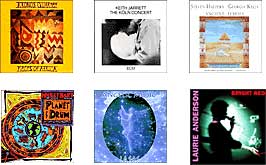 |


 |
If you are a singer/songwriter or in a band, you probably know how hard
it is to get a record deal, or generate any professional interest. Perhaps
you’re sending out dozens of demo copies, to no avail.
If your demo CD has a poor package design (or is scrawled on with a Sharpie
– yikes!), chances are that your demo never even got a listen. So,
we’ve put together a list of professional CD cover art design tips
for musicians, or anyone who wants a CD design that will get noticed.
Special thanks goes to professional CD cover artist, Carol Wright, for giving
us many of these tips.
 Design for
one-inch size. One inch is all the space your cover will get on most online
music stores and in many review publications. If published in a printed
review, it might also be in black and white. Design for
one-inch size. One inch is all the space your cover will get on most online
music stores and in many review publications. If published in a printed
review, it might also be in black and white.

 Keep contrast in mind. Don’t put type, such as the name of your band,
on top of a busy background. If you do, your name will get lost in the mess.
Consider having a clean background. Likewise, don’t use a font color
that has too little contrast against a dark background. If you must break
these rules, consider using a decent drop shadow that will make the name
of your band pop out from the design underneath.
Keep contrast in mind. Don’t put type, such as the name of your band,
on top of a busy background. If you do, your name will get lost in the mess.
Consider having a clean background. Likewise, don’t use a font color
that has too little contrast against a dark background. If you must break
these rules, consider using a decent drop shadow that will make the name
of your band pop out from the design underneath.
 Use a font that can be read...easily. Crazy fonts or script fonts might
be fun, but they will be difficult to read. If in doubt, stick to the old
standbyes, like Arial, Myriad or Helvetica.
Use a font that can be read...easily. Crazy fonts or script fonts might
be fun, but they will be difficult to read. If in doubt, stick to the old
standbyes, like Arial, Myriad or Helvetica.
 Try to stand apart from the crowd. This advice comes with a bit of caution.
If you are trying to appeal to a record exec, they’re more interested
in your musical talent than what your demo cover looks like, so it might
be better to keep it simple. If you’re trying to sell records directly
to consumers, however, we suggest doing some research in record stores to
see which designs catch your eye, and then applying what you’ve learned
when designing your own cover art. You might also want to consider
purchasing a CD printer
and print directly to the CD instead of a label. CD printers
offer improved legibility and add a touch of professionalism.
Try to stand apart from the crowd. This advice comes with a bit of caution.
If you are trying to appeal to a record exec, they’re more interested
in your musical talent than what your demo cover looks like, so it might
be better to keep it simple. If you’re trying to sell records directly
to consumers, however, we suggest doing some research in record stores to
see which designs catch your eye, and then applying what you’ve learned
when designing your own cover art. You might also want to consider
purchasing a CD printer
and print directly to the CD instead of a label. CD printers
offer improved legibility and add a touch of professionalism.
 Don’t forget the info. Carol Wright says, "Always print the track number, track title,
and play times in LARGE print on the back of the CD cover AND on the CD
itself. DJs, for instance, depend on this information to plan their shows."
Another tip: Try providing a quick definition of your musical style on the
cover, so the person flipping through a stack of demo CDs will now have
an idea of the type of music you create.
Don’t forget the info. Carol Wright says, "Always print the track number, track title,
and play times in LARGE print on the back of the CD cover AND on the CD
itself. DJs, for instance, depend on this information to plan their shows."
Another tip: Try providing a quick definition of your musical style on the
cover, so the person flipping through a stack of demo CDs will now have
an idea of the type of music you create.
And don’t forget your contact details, including name, company, address
and phone number. This might seem like a no-brainer, but you’d be
surprised how many artists will leave it off.
 Don’t be spine-less. Use clear standard jewel cases and use the "spine"
to print additional information. For the spine, use black text on white
background, and avoid graphics altogether.
Don’t be spine-less. Use clear standard jewel cases and use the "spine"
to print additional information. For the spine, use black text on white
background, and avoid graphics altogether.
 Don't forget your rights. Include
a copyright notice to show your ownership of the music. Include the copyright
symbol, the date the work was first published and your name or label named,
and add "All rights reserved," for example:
Don't forget your rights. Include
a copyright notice to show your ownership of the music. Include the copyright
symbol, the date the work was first published and your name or label named,
and add "All rights reserved," for example:
 © 2004 My Music Label.
All rights reserved. © 2004 My Music Label.
All rights reserved.
SureThing's circular text tool is ideal for placing copyright notices on
CDs and DVDs.
|
|